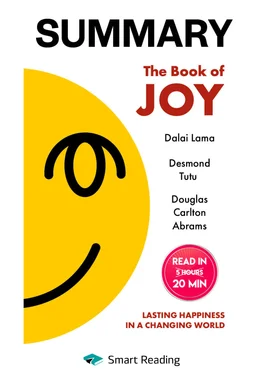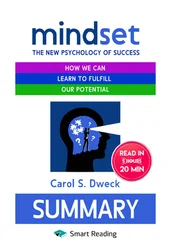Summary: The Book of Joy. Dalai Lama, Desmond Tutu, Douglas Carlton Abrams
Автор:
Dalai Lama, Desmond Tutu, Douglas Carlton Abrams
Оригинальное название:
The Book of Joy
www.smartreading.ru
A meeting of two friends, the most prominent modern-day spiritual leaders
Both His Holiness the 14th Dalai Lama and Archbishop Desmond Tutu are great spiritual teachers of the modern world. Although they belong to different religious denominations, their teachings go far beyond religious traditions. They care about the fate of all mankind, and by their example they inspire millions of people around the world to grow spiritually.
Although Archbishop Tutu and His Holiness the Dalai Lama met only a few times in their lives, they have developed a close friendship and humorously refer to each other as "mischievous spiritual brothers." In 2015 they met in Dharamshala [1] Dharamshala is a city in the north of India where the Dalai Lama’s residence is situated.
to celebrate His Holiness’ 80th birthday and spend time together. This visit had been prepared for a year and was repeatedly in danger of cancellation – both because of the Archbishop’s health condition and for political reasons. They looked forward to this opportunity since they knew that it would probably be the last time they will see each other. As a result, one of the important goals of their meeting was the creation of this book, which His Holiness called "a gift for everyone".
Throughout their lives, they have faced many hardships and losses, the fight against apartheid, against which the Archbishop played an active role, and the Dalai Lama’s life in exile being some of the most obvious. Nevertheless, they managed to maintain the ability to enjoy life and be in a state of mindfulness. In this book, they decide to share what they had learned over the years and answer the question together, "How can we find joy in the face of the inevitable suffering of our lives?" It turned out to be the most common of the questions that Douglas Abrams collected around the world specifically for this meeting.
Both spiritual leaders believe that to become happy one needs to remember that one is responsible to all people and to develop love and compassion in oneself. These qualities lead to the peace of mind and true joy. According to Archbishop Tutu, true joy fills life with meaning and makes us more spiritual.
And any sufferings are an opportunity to develop positive qualities that will support this joy.
Thanks to hardships and suffering, one is able to become more attentive to others, more compassionate and generous. Our reaction to hardships and suffering is a reflection of the level of our spiritual development and the path we are following. If everyone perceives hardships as steps toward growth, according to the two most joyful people in the world, together we will save the planet from true suffering.
For one week Douglas Abrams asked His Holiness and the Archbishop questions and recorded their answers. Thanks to this book, several points of view on the nature of joy at the same time – the view of the Buddhist Dalai Lama, the view of the Christian Archbishop Tutu and the view of scientists presented by Douglas Abrams – have been collated into a single collection. This combination of diverse attitudes makes the book authentic and useful for anyone who would like to make life more joyful and mindful.
Watching how His Holiness and the Archbishop communicate during the week, Douglas Abrams was struck by how open and cheerful these great people are, despite their having experienced much suffering in their lives. They were sincerely delighted by every moment of their communication: they could start a heated argument, but would soon after exchange friendly handshakes and make fun of each other. When they talked about sad events of their lives, they were not shy to shed tears, but as soon as their stories were over, sincere smiles immediately appeared on their faces. Their ability to maintain their inner joy and to regularly return to this state had become the central topic of the week’s conversations.
In the modern world, we pay much attention to gaining material wealth and stability, but in return we experience only anxiety and lose contact with other people. Real long-term joy cannot be acquired while one pursues material values, as real joy does not depend on fate or luck and is within each of us at this very moment. According to the Dalai Lama and the Archbishop, such a state of mind is an important condition not only for developing personally but also for building a peaceful society.
In his works, psychologist Paul Ekman lists various feelings associated with joy, from pleasure (sensual joy) and amusement to the awe we feel when we see the kindness and compassion of others.
Buddhist scientists Matthieu Ricard [2] Matthieu Ricard received a PhD in molecular genetics at the Pasteur Institute (Paris, France) but rejected his scientific career to study Tibetan Buddhism.
also describes three states of spiritual joy: appreciative joy (an ability to rejoice in someone else’s happiness); delight (an ability to be deeply satisfied) and proselytization (peaceful joy born from a deep state of balance and friendliness).
According to the Dalai Lama, joy is the state we acquire when we’re achieving the most important goal of our life; that is, the elimination of suffering and the attainment of happiness. Despite the fact that joy we achieve will not relieve us of the inevitable difficulties in we will face in life, it will nevertheless make it easier for us to deal with them.
Of the four basic emotions – anger, fear, sadness, and joy – only joy is positive. By studying it, we will be able to understand what really makes us happy and find the answer to the question, "How can the state of joy be developed to such an extent that it becomes permanent?"
First of all, one needs to learn to distinguish between two kinds of happiness. The first type of happiness is derived from sensual pleasures such as food and sex, and is limited in time and can quickly be replaced by negative feelings once the good feelings pass. The second type, mental inner happiness, is deeper. At this level, joy is felt more fully and lastingly. [3] In psychology there is a term "hedonistic adaptation": scientists have found that too many sensory pleasures dull the senses; as a result we start to take pleasure for granted.
The neuroscientist Richard Davidson created a unified theory of a happy brain according to which there are four states of the brain that affect the duration of our well-being: the ability to stay positive, which directly influences our ability to experience happiness; the ability to recover from consequences of negative outcomes; the ability to concentrate, which is developed through the practice of meditation; and, the ability to be generous.
Obstacles Preventing Us From Enjoying Life
There are many factors preventing us from feeling joy. They range from everyday stress and anxiety to catastrophes that completely change people’s lives. We all know what physical pain is and how to deal with it, but often we do not know how to deal with mental pain and we do our best to alter our reality. Though we cannot always do this, we are able to control the extent to which external circumstances affect us.
▶Pain and Suffering
Even painful situations can actually bring satisfaction and happiness.
The Archbishop gives an example of a mother right before she gives birth. She knows that she will suffer great pain bt she accepts this. And as soon as the baby is born, she feels incredible joy.
Читать дальше












